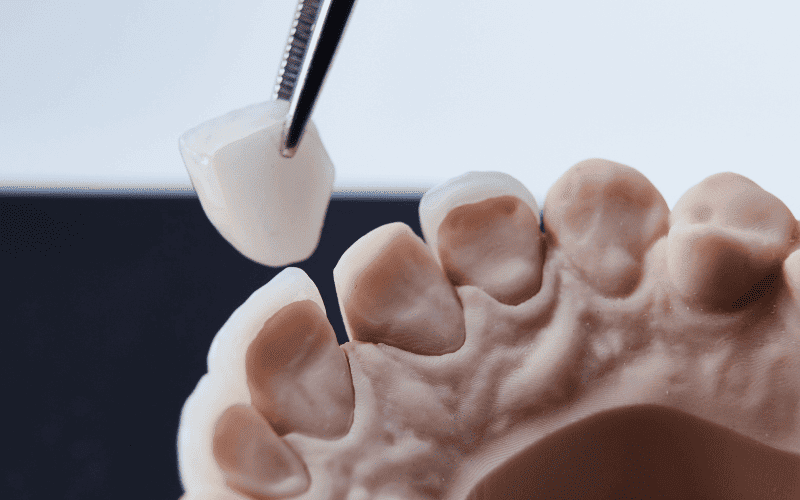
Understanding Lifespan and Maintenance for Your Dental Crown
Dental crowns are the sturdy and versatile workhorses of restorative dentistry. These custom-crafted caps, often made of porcelain or metal, fit snugly over a damaged or weakened tooth, restoring its strength, function, and aesthetics. But like any restoration, dental crowns have a finite lifespan, and proper maintenance is key to maximizing their longevity.
This blog delves into the world of dental crowns, exploring their typical lifespan, the factors that influence it, and the essential maintenance practices to keep your crown in tip-top shape.
How Long Does a Dental Crown Last?
The average lifespan of a dental crown can range anywhere from 5 to 15 years. This wide range depends on several factors, including:
- Material: Different materials have varying degrees of strength and resilience. Porcelain crowns, for instance, offer excellent aesthetics but may chip or break under excessive pressure. Zirconia crowns, on the other hand, are stronger and more durable.
- Your Bite and Habits: Do you grind your teeth? Do you enjoy chewing on hard objects like ice? These habits can put undue stress on your crown, accelerating wear and tear.
- Oral Hygiene: Regular brushing, flossing, and professional cleanings are crucial for maintaining good oral health around the crowned tooth. Poor hygiene can lead to decay at the margins of the crown, compromising its integrity.
- Placement and Purpose: A crown placed on a front tooth will likely experience less wear compared to one on a molar used for chewing.
- The Quality of the Crown: The skill and experience of the dentist who creates and places the crown play a significant role in its longevity.
While 15 years is considered a good benchmark, it’s important to remember that every crown is unique. If you’re in the Bellevue area and have any questions about your specific crown, consulting a trusted dentist in Bellevue can provide personalized insights.
Signs Your Dental Crown Might Need Attention
Here are some signs that your dental crown might be nearing the end of its lifespan and require attention:
- Chipping or Cracked Crown: This is a common issue with porcelain crowns, especially if you grind your teeth or chew on hard objects. A chipped crown weakens the structure and exposes the underlying tooth, making it susceptible to decay.
- Loose Crown: Over time, the cement holding the crown in place can weaken, causing the crown to feel loose or slightly movable. This can be a symptom of decay beneath the crown and requires immediate attention from a dentist.
- Pain or Sensitivity: Pain or discomfort around the crowned tooth could indicate underlying decay, gum disease, or an improperly placed crown.
- Darkening of the Crown Margin: A visible dark line at the gumline where the crown meets the tooth can be a sign of decay developing under the crown.
Maintaining Your Dental Crown for a Long and Healthy Life
By following these simple maintenance practices, you can significantly extend the lifespan of your dental crown and keep your smile healthy:
- Maintain Excellent Oral Hygiene: Brush twice daily for two minutes with a soft-bristled toothbrush and floss at least once a day. Pay particular attention to the area around the crowned tooth.
- Schedule Regular Dental Checkups and Cleanings: Your dentist can monitor the condition of your crown, check for any signs of wear or decay, and perform professional cleanings to remove plaque and tartar buildup.
- Avoid Chewing on Hard Objects: This includes ice, hard candy, nuts, and other items that can put undue stress on your crown and potentially damage it.
- Wear a Mouthguard: If you grind your teeth or play contact sports, wearing a mouthguard can protect your teeth and crown from injury.
- Practice Good Dietary Habits: Limit sugary foods and drinks that contribute to tooth decay.
Beyond the Basics: Optimizing Your Crown’s Lifespan
Here are some additional tips for maximizing the life of your dental crown:
- Choose the Right Material: Discuss your options with your dentist and choose a material that best suits your needs and bite strength. For instance, if you grind your teeth, a zirconia crown might offer a better long-term solution.
- Invest in High-Quality Dentistry: While cost is a factor, choosing a skilled and experienced dentist who uses high-quality materials can significantly impact the longevity of your crown.
- Address Issues Promptly: Don’t ignore any signs of trouble, like a chipped crown or loose feeling. Early intervention can prevent more extensive and expensive repairs later.
By prioritizing good oral hygiene, maintaining regular dental visits, and following these simple tips, you can ensure your dental crown serves you well for many years to come. Remember, a healthy smile starts with preventative care, and your dental crown is no exception.
Living with a Crown: Considerations and Additional Tips
While dental crowns offer a reliable and durable solution for restoring teeth, there are a few additional considerations to keep in mind when living with a crown:
- Sensitivity: There might be some initial sensitivity to hot or cold after getting a crown placed. This usually subsides within a few weeks. If the sensitivity persists, however, consult your dentist to rule out any underlying issues.
- Adjustments: It may take some time to adjust to the feel of a new crown, especially regarding biting and chewing. Your dentist can make minor adjustments if needed to ensure a comfortable fit.
- Aesthetics: Dental crowns can be color-matched to blend seamlessly with your surrounding teeth. However, over time, natural teeth can darken due to aging and staining from food and beverages. While crowns typically resist staining better, slight color mismatches might develop. Discuss any aesthetic concerns with your dentist during the consultation process.
- Replacement: No dental restoration lasts forever. Even with proper care, your crown might eventually need replacement due to wear and tear, damage, or changes in your oral health. Regular dental checkups will help identify any potential issues before they become major problems.
The Takeaway: A Worthy Investment in Your Smile
Dental crowns are a valuable investment in your oral health and overall well-being. They restore functionality, improve aesthetics, and allow you to enjoy your favorite foods with confidence. By understanding the factors influencing their lifespan, implementing proper maintenance routines, and seeking professional care when needed, you can maximize the longevity of your crown and enjoy a healthy, beautiful smile for years to come.
If you’re in the Bellevue area and considering dental crowns, a consultation with a qualified dentist can provide personalized insights based on your specific needs. They can discuss the various crown materials, answer your questions, and develop a treatment plan tailored to your situation. Remember, prioritizing your oral health is an investment in your overall well-being.




